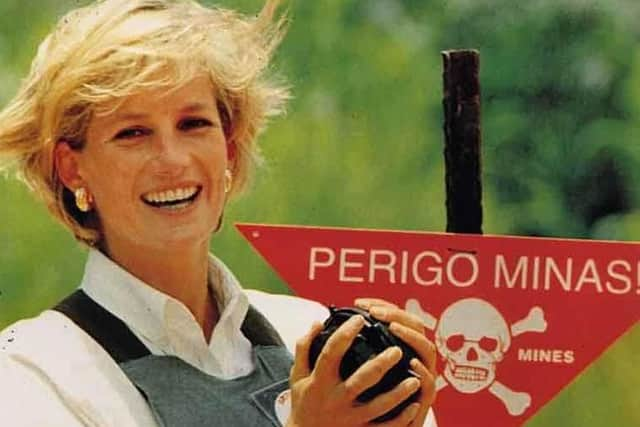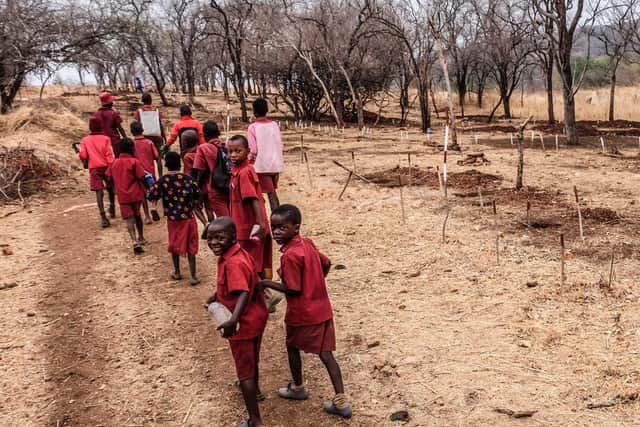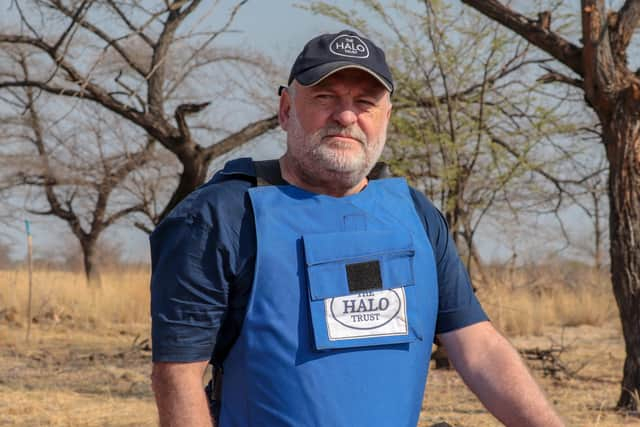Prince Harry and The Halo Trust need readers’ help to eradicate landmines


That’s the stark choice facing parents in the Zimbabwean village of Musanzikwa, who live their daily lives – trapped between two minefields.
Older pupils shepherd the younger ones to safeguard them from danger but many parents, understandably, are too frightened to allow their children to go to school.
Advertisement
Hide AdAdvertisement
Hide AdThe parents also can’t grow crops on their land as it is peppered with landmines.


But Scottish charity The Halo Trust hopes to change that picture – with a little help from our readers.
Prince Harry recently visited Angola, where his mum Princess Diana first raised awareness of landmines and The Halo Trust’s work in 1997 – just weeks before her untimely death.
During an emotional visit, the prince said: “Landmines are an unhealed scar of war. They threaten lives and livelihoods.
Advertisement
Hide AdAdvertisement
Hide Ad“Few things give me greater pleasure than seeing one destroyed.


“The UK is a long-time humanitarian de-mining partner of Angola. Over the years we have worked together to bring funding and cutting-edge expertise to Angolan communities and fostered partnerships with organisations such as The HALO Trust.
“It was an honour to re-trace my mother’s steps. I lost her 22 years ago but the memory of her is with me daily and her legacy lives on.”
The visit was perfectly timed to coincide with The Halo Trust’s Breaking Boundaries campaign.
Advertisement
Hide AdAdvertisement
Hide AdIt hopes to raise at least £200,000 between now and December 22 – all of which will be match funded by the UK government.


The funds will enable Halo employees to work with the local community in Musanzikwa to clear the landmines and improve the lives of countless families who live in the region.
The landmines in Zimbabwe were laid in the 1970s but remain highly dangerous and the country is still one of the worst-affected in the world, with more than 75,000 people living near dense minefields.
The mines force people to risk their lives every day to reach schools, water supplies, clinics and crops.
Advertisement
Hide AdAdvertisement
Hide AdSo The Halo Trust was delighted, at its second attempt, to secure support from the government’s international development arm, UK Aid.
It will match all public donations to the campaign received before the deadline on December 22.
James Cowan, HALO’s CEO, said: “The UK’s support to Halo has freed hundreds of thousands of people from the fear of landmines and helped them rebuild their lives after conflict.
“Now the public can donate to the Breaking Boundaries appeal knowing that every pound they give will be doubled by the UK Government.
Advertisement
Hide AdAdvertisement
Hide Ad“We will clear twice as many minefields and help twice as many people thanks to this new campaign.”
Halo’s communications chief Paul McCann knows just how much every pound will help the charity, which now has more than 8000 workers across the globe – providing expertise and jobs for people who live daily with the fear of landmines.
He said: “Every £3 that is donated will buy enough TNT to destroy a landmine; £10 will help clear a safe path to school and £25 will help pay a deminer for one day.
“Every penny donated by the public will be match funded by UK Aid to help transform the lives of villagers in Musanzikwa.
Advertisement
Hide AdAdvertisement
Hide Ad“Parents there have to decide whether to send their children to school, following a well-trodden path through two minefields.
“Would you want to send your five-year-old to school if that was what they had to face every day?
“It’s difficult for us to imagine it here: our office, children’s school and local hospital being cut off and impossible to reach without crossing a minefield.
“But that’s the reality for families living along Zimbabwe’s borders.
Advertisement
Hide AdAdvertisement
Hide Ad“Life in Musanzikwa is particularly precarious as it is trapped between two minefields.
“Every penny raised from Breaking Boundaries will help villagers rebuild their lives, tend their crops and ensure the children can get to and from school safely.”
Arguably, the children who live with the threat every day sum up the situation best – with 10-year-olds shielding their younger siblings and friends from danger.
Damson Shimakon (10), said: “We tell each other to be careful of the landmines.
Advertisement
Hide AdAdvertisement
Hide Ad“We walk in groups to make sure the younger kids don’t walk off the path.”
The Halo Trust was founded in 1988 to help people in Afghanistan rebuild their lives.
But it now works in 27 countries and territories around the world, where it employs not only specialist teams but locals who help to demine land.
Paul said: “We not only help rebuild communities and lives but employ many people in these countries who have been able to send their children to school and university as a result.”
Advertisement
Hide AdAdvertisement
Hide AdThe charity celebrated its 30th anniversary last year and it had much to toast – having destroyed 1.6 million landmines in that time.
But there is much still to be done.
Paul added: “We’ve saved countless lives around the world so far but there are many more landmines and IEDs still to clear so our work is far from done.”
For more information on the campaign or to donate funds, visit www.halotrust.org/breaking-boundaries.